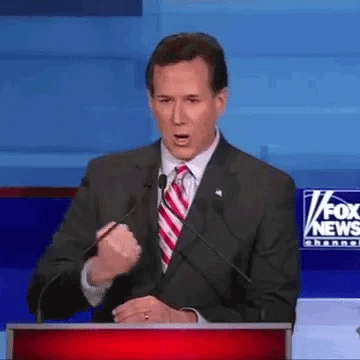Former Sen. Rick Santorum (R-PA) demonstrates what Republicans plan to do to America
(On Wednesday, 2.1.23, North Stars and Cowboy Bars will become a (mostly) paid site. More details will follow later this week, but I hope my readers value what I do here enough to support me. It requires a lot of time and effort. Stay tuned!)
To become Speaker of the House, Kevin McCarthy had to sell his soul make all manner of disgusting promises to the Republican Freedom Caucus. It’s quite a laundry list, but some of the lowlights indicate just how far the House GOP Caucus (and McCarthy) have fallen.
Rep. Matt Gaetz (R-FL) is guaranteed a fresh weekly underage ponytailed blonde intern armed with a pair of kneepads.
Rep. Marjorie Taylor Greene (R-GA) was promised that she’ll be able to execute one godless Democrat of her choice on the 10th, 15th, and 20th of each month.
Rep. Lauren Boebert (R-CO) was guaranteed the right to force Rep. Adam Schiff (D-CA) to play four rounds of Russian Roulette on the 1st and 15th of each month. In the event that Schiff loses, Boebert gets to choose the Democrat of her choice to replace him.
Rep. Steve Scalise (R-LA) will be able to burn a cross in the well of the House every Monday before the opening prayer.
Rep. Paul Gosar (R-AZ), who actually is a dentist, will be allowed to re-enact the dentist chair scene from Marathon Man. Each week, Gosar will be allowed to select a different Democrat to play the Dustin Hoffman character who will suffer through having a tooth removed sans anesthetic.
But the absolute worst is McCarthy agreeing to allow freshman Rep. Earl L. "Buddy" Carter (R-GA) to introduce something called the “Fair Tax” plan. To be certain, it’s a “tax” plan, and it’s “fair” only if you’re a billionaire, so in that sense, it’s a “Fair Tax,” eh?
[The] "Fair Tax" plan, which must always be written with irony quotes because it would give the wealthiest Americans even greater advantages than our already unfair tax system already does.
Various versions of the "fair tax," which would allegedly replace the income tax, payroll taxes, and all other federal taxes with a 30 percent national sales tax, keep getting introduced by wacko Republicans every session of Congress since 1999, and most of the time they promptly die in committee because not even most Republicans think it's a good idea.
Flat Earth Republicans still believe a flat tax is THE path to peace and happiness reigning throughout the kingdom.
Except that you don’t have to be a post-doctoral fellow in Reaganomics to understand that a flat tax, while it might sound good (everyone pays that same rate!!), would create widespread economic disaster.
Actually, not to brag too much, but my kid figured that out when they were only six years old. A friend's mom had for some reason had to attend some meeting where a guy was advocating the "fair tax" — like almost any terrible idea, it has a national organization to push it — so she took Kid and her own daughter along. The guy explained that a flat tax would be fairer because everyone pays the same percentage, simplifying by telling Kid and Friend how it would work: If someone had a hundred dollars, they'd pay just ten dollars in tax, and if someone had a thousand dollars, they'd pay a hundred dollars.
Kid raised their hand and pointed out that only having $90 left to get by on would be a lot harder for the first person, while having $900 is pretty comfortable for the second, and that's why we have progressive income taxes you fool, and the workers should throw off rule by the bourgeoisie and seize the means of production. (I may have embellished the story a bit.)
You see, a flat tax is not just simple, it’s ridiculously and overly simplistic. The worst impact of a flat tax is that it would supercharge inequality. The paragraph above is a simplistic, but very accurate explanation of how that would work. The poor and middle class would be hit the hardest, while the wealthiest Americans would benefit the most.
Quelle surprise….
Or you could use the Mother Jones explanation:
The “fair tax” is a complete makeover of the federal tax system. It repeals payroll taxes, gift and estate taxes, capital gains taxes, and personal and corporate income taxes. In their place, it institutes a 30 percent levy on all new, finished goods and services. (So that $10 six-pack would run you $13, and the feds get three bucks.)
Sales taxes are regressive—harder on the poor than the rich. To offset that, the proposal calls for monthly government “prebate” checks for all US citizens, payments that would be proportionately more meaningful to lower-income families….“The main problem,” UC Berkeley economist Gabriel Zucman told me in an email, “is that it would turbocharge inequality. Because the rich save most of their income.” In other words, replacing income taxes with a consumption tax amounts to a tax cut for the wealthy, whereas folks living paycheck to paycheck would face a substantial tax increase. [...] Zucman and his Berkeley colleague Emmanuel Saez have found that when all of our taxes (federal, state, and local) are combined, the result is something like a flat tax—averaging 28 percent across income categories. The poorest Americans pay a bit less than average (~25 percent) while most very high earners pay more (30 to 35 percent), but the wealthiest of all, the billionaires, enjoy the lowest overall rate (23 percent). Under a “fair tax” plan, they might pay even less.
The Flat Earth Republicans who push the “fair tax” plan say that one of its selling points is its simplicity (everyone pays the same rate!!). Except that, as with any tax plan, once you dig past the outer layer of bullshit and propaganda, it’s not nearly as simple as it’s made out to be.
The Institute on Taxation and Economic Policy points out that the "fair tax" plan to have states collect 30 percent federal sales taxes, on top of their own sales taxes, would be incredibly confusing, especially since five states simply don't have sales taxes, and the rest all have different exemptions for what's subject to sales tax. Shoppers who don't pay taxes on food in some states, for instance, would suddenly be paying 30 percent more for all their groceries.
And just sorting all that out and collecting the taxes from the states would require a federal agency to make sense of it, so look at that, we still have an IRS.
And we all know how Republicans feel about the IRS, don’t we?
Then, as ITEP explains, the proponents of the “fair tax” plan contend that the 30% sales tax isn’t actually a 30% tax, but rather a 23% tax.
And this is where my History major brain combines with my ADD to make my head want to ‘splode.
Under the bill, if you buy something that costs $100 before tax, you pay $30 of national sales tax. Most of us would call that a 30 percent sales tax. Proponents, however, call it a 23 percent tax, because that $30 is 23 percent of your “gross payment” of $130, your payment including the sales tax. Proponents claim this method of calculation is more comparable to how we think about the income tax but its main result is widespread confusion.
OK, so the “widespread confusion” part I understand, but the rest of it? Not so much. And I’m a pretty intelligent guy.
Of course, the odds of the “fair tax” plan passing both houses of Congress and being signed into law by President Joe Biden are about the same as my winning a Nobel Prize. The President has already made it quite clear that a “fair tax” such as what Buddy Carter is proposing is nonsense and will get his signature when his son Beau rises from the dead.
What’s interesting is how thoroughly Carter’s bill thoroughly rejects the original philosophy of the Republican Party as it pertained to taxation:
But the measure is illuminating. It explicitly rejects the position, and the principles, of the original Republican Party.
Members of the Republican Party invented the U.S. income tax during the Civil War, and they created the precursor to the IRS to collect it. To find money to fight the war, they raised tariffs on common products but immediately turned to the novel idea of an income tax, and a graduated one at that, to make sure that “the burdens will be more equalized on all classes of the community, more especially on those who are able to bear them,” as Senator William Pitt Fessenden (R-ME) put it.
Justin Smith Morrill (R-VT) agreed. “The weight [of] taxation must be distributed equally,” he said, “Not upon each man an equal amount, but a tax proportionate to his ability to pay.”
The Republicans then quite deliberately constructed a national system for collecting the new taxes. In the midst of the Civil War, they urged their colleagues to imagine what would happen if a disloyal state were permitted to manage the collection itself. A Democratic legislature could simply refuse, and the government might perish for lack of funds to support the troops. The government had a right to “demand” 99 percent of a man’s property for an urgent necessity, Morrill said. When the public required it, “the property of the people…belongs to the Government.”
Today’s Republicans are taking a position opposite to the one that the men who formed the Republican Party did during the Civil War. They want to get rid of the income tax and put state governments in charge of the nation’s revenue system. Wording in the measure suggests that this change is because state governments have expertise in sales taxes, but it is no accident that the plan dismantles the federal system that Civil War Republicans accurately noted gives Americans “a sense of personal responsibility in the safety and stability of the nation.”
So why does such nonsense rear its ugly head during every Congress? Why do Flat Earth Republicans continue to believe that a “fair tax” plan will bring America peace, prosperity, and the Second Coming of the Dallas Cowboys? Perhaps because they believe what they choose to, even as they ignore warnings from economists and those who know what they’re talking about.
There’s nothing “fair” about Carter’s “fair tax” plan. It would supercharge inequality, make the rich even richer, and screw over anyone not fortunate enough to call a “C” suite home.
Who says America isn’t the home to a creeping oligarchy? And we’re on the outside looking in, don’tchaknow?







Excellent description of grotesquely unfair character of flat taxes. I don't know why I've never noticed this before (I mean, the whole "Ph.D." in philosophy thing that I have suggests that I at least *ought* to notice such things) but Aristotle was already describing and discussing many of these issues when he explored the different kinds of "equality" in the 'Nicomachean Ethics.' Some 2400 years ago, so it is not as though these issues were new and nobody has ever had a chance to think about them.